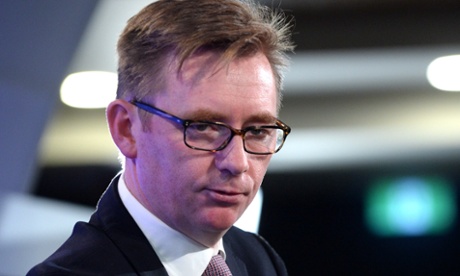Medical association also calls for blanket exemptions for concession card holders and children under 16

The Australian Medical Association (AMA) has called on the government to cut the proposed $7 co-payment for GP visits to $6.15, with blanket exemptions for concession card holders and patients under 16.
The government’s proposal to cut $5 from Medicare Benefits Schedule (MBS) rebates received by GPs would also be axed under the AMA’s plan, which was released on Thursday amid considerable uncertainty over the fate of the contentious budget measure.
The AMA’s solution, if adopted, would threaten the $3.5bn that the government had budgeted over five years for the medical research future fund.
The government had planned to reduce MBS rebates by $5 for standard GP consultations and out-of-hospital pathology and diagnostic imaging services and allow the providers of these services to collect a patient contribution of $7 per service. This meant $2 of the proposed $7 co-payment would go to the provider.
But the government’s budget measure lacks adequate support to pass the Senate, with Labor, the Greens and the Palmer United party opposed.
Labor and the Greens argued any form of Medicare co-payment undermined the universality of the healthcare system, while the government has signalled its reluctance to allow blanket exemptions to its proposed co-payment.
The AMA’s president, Brian Owler, who provided the proposal to the government weeks ago, said on Thursday the measure outlined in the budget was “seriously flawed” and should be dumped.
Explaining the AMA’s alternative, Owler said: “We propose a minimum $6.15 co-payment – which aligns with the current bulk-billing incentive – that applies to all patients, but the government will pay the co-payment for concession card holders and patients under 16 years of age.
“Under our model, there will be no cut to the Medicare patient rebate, and there is an incentive for general practices to collect the co-payment.”
Owler said the AMA “supported well-designed and well-intentioned co-payments, and that is what we are releasing today”.
“Co-payments already exist. About 20% of GP visits currently attract a co-payment,” he said. “The AMA co-payment model allows GPs the opportunity to spend more time with their patients, provide preventive health care and chronic disease management, and place a value on the essential service they provide.
“It maximises the benefits of high-quality primary care in general practice, keeping people well, and keeping people out of more expensive hospital care.
“We are confident that our co-payment model will stimulate robust debate in the community, in the political arena, and in the health sector, and remind the government of the unfairness, inequity and electoral unpopularity of its budget co-payment proposals.”
The AMA said its alternative model would not oblige GPs to charge a co-payment for Medicare-funded chronic disease services, health assessments and mental health treatment items. Residential aged care visits and home visits would also be excluded.
However, for other patients doctors would be obliged to charge the minimum Medicare co-payment for standard GP consultations in rooms. “Like now, a GP will retain the discretion to charge a higher amount for general patients,” the AMA said.
The AMA called on the government to defer the proposed application of a co-payment to pathology and diagnostic imaging for two years to resolve practical issues and impacts on the viability of practices.
The government is considering the AMA plan and talking to crossbenchers in an attempt to find a way to secure Senate passage of its bill, but the counter-proposal represents a significant departure from the originally budgeted measure.
The treasurer, Joe Hockey, said on Thursday the government was “always prepared to have sensible discussions with sensible people” to ensure the protection of the most vulnerable, but also wanted to ensure the system was affordable in the future.
“I’ve already met with the AMA and they have already put a proposal to the minister for health. I’m glad that they do support the concept of a co-payment. I think that is hugely important,” Hockey said.
Tony Abbott said he respected and valued Medicare as an “iconic Australian institution” but the introduction of a “modest co-payment” would ensure that people valued the vital services they received.
The prime minister defended the structure of the measure announced in the budget.
Labor’s treasury spokesman, Chris Bowen, said the opposition would defend the “important principle” that people should be able to go to the doctor as many times as needed regardless of their income.
“That is a principle of the Labor party that we will fight for. You can’t have half a principle,” Bowen said.
“To go to the doctor for free is an important part of the universality of healthcare and we will defend that.”
The health minister, Peter Dutton, said the government was working on financial analysis of the AMA’s plan, but it was a “long run negotiation” and there was no rush.
“It’s important to bear in mind the co-payment has a start date of 1 July next year. We will work towards that,” Dutton said.
Terry Barnes, a former health adviser to Abbott when he was health minister, called for scrutiny of the AMA plan to ensure it was in the interests of all, not just the AMA’s members. Barnes kickstarted debate over a GP co-payment in a submission to the government’s commission of audit late last year.
